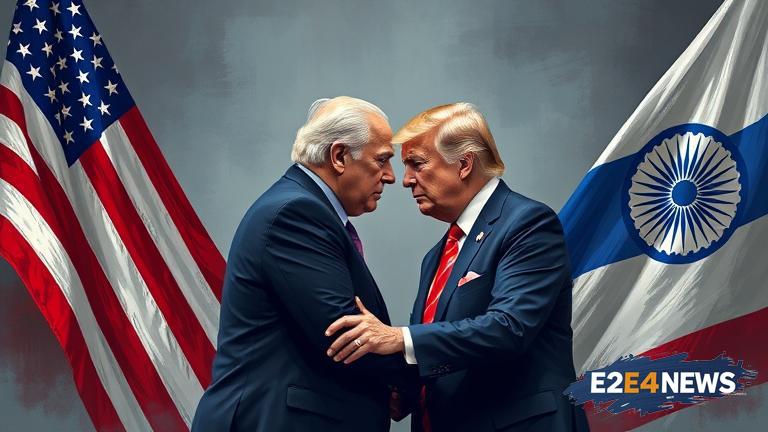The United States and India have long been considered strategic partners, with a strong foundation of diplomatic and economic cooperation. However, the relationship is facing a new challenge as former President Donald Trump has threatened to impose secondary sanctions on India over its purchases of Russian oil. This move has sparked concerns about the future of bilateral ties and the potential consequences for the global economy. India has been a significant buyer of Russian oil, taking advantage of discounted prices to meet its growing energy needs. The US has been critical of India’s decision to continue purchasing Russian oil, citing concerns about Russia’s actions in Ukraine and the need to isolate Moscow economically. Trump’s threat of secondary sanctions has been seen as a significant escalation of tensions between the two countries. The sanctions would target Indian companies and individuals that continue to do business with Russia, potentially crippling India’s economy. The Indian government has responded to the threat by stating that it will not be intimidated by the US and will continue to prioritize its own economic interests. The situation has sparked a heated debate about the role of the US in shaping global energy policy and the potential consequences of its actions. Some analysts have argued that the US is using its economic leverage to bully other countries into complying with its foreign policy objectives. Others have pointed out that the US is hypocritical in its criticism of India, given its own history of dealing with authoritarian regimes. The situation has also raised questions about the future of the US-India relationship, with some wondering if the partnership can survive the current tensions. The US has long seen India as a key partner in its efforts to counterbalance China’s growing influence in Asia. However, the current dispute over Russian oil purchases has created a significant rift between the two countries. India has been seeking to diversify its energy sources and reduce its dependence on any one country. The country has also been investing heavily in renewable energy, with a goal of generating 40% of its electricity from non-fossil fuels by 2030. Despite these efforts, India remains heavily reliant on imported oil, making it vulnerable to fluctuations in the global energy market. The US has been pushing India to reduce its dependence on Russian oil and instead purchase more oil from the US. However, India has been resistant to this pressure, citing concerns about the cost and reliability of US oil supplies. The current dispute has also sparked a wider debate about the role of energy in international relations. Some analysts have argued that the global energy market is becoming increasingly politicized, with countries using energy as a tool to exert influence over other nations. Others have pointed out that the current system of global energy governance is inadequate and in need of reform. The situation has also raised questions about the potential consequences of the US sanctions for the global economy. Some analysts have warned that the sanctions could lead to a significant increase in oil prices, potentially triggering a global recession. Others have pointed out that the sanctions could also have unintended consequences, such as driving India closer to China and Russia. The Indian government has been seeking to mitigate the impact of the sanctions by diversifying its energy sources and reducing its dependence on any one country. The country has also been investing in domestic oil production, with a goal of reducing its reliance on imported oil. Despite these efforts, the current dispute has created a significant challenge for the Indian government, which must balance its own economic interests with the need to maintain good relations with the US. The situation has also sparked a wider debate about the future of the global energy market and the role of the US in shaping international relations. Some analysts have argued that the US is using its economic leverage to assert its dominance over the global energy market. Others have pointed out that the US is facing significant challenges from other countries, including China and Russia, which are seeking to reduce their dependence on US energy supplies.





